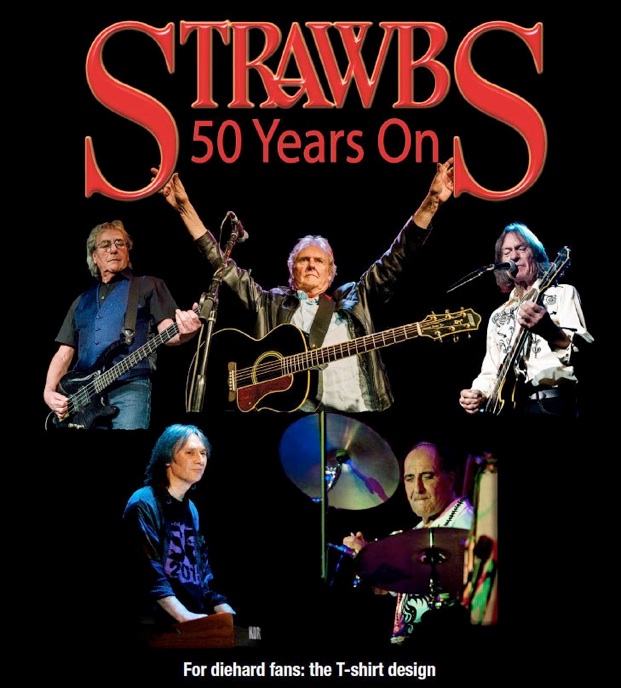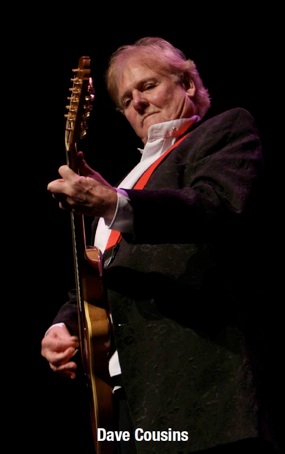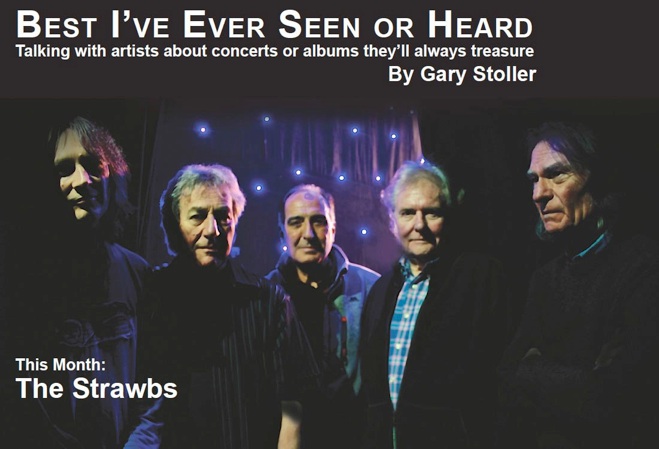As the Strawbs get set to celebrate their 50th anniversary with three days of special shows at the Strand Center for the Arts in Lakewood, New Jersey, April 26-28, I ask Dave Cousins for some of his special memories.
“Playing our first major solo concert with Rick Wakeman at the Queen Elizabeth Hall in London after just six weeks as a five-piece band was intimidating but utterly rewarding,” says Cousins, the Strawbs’ lead singer who co-founded the group in England in the mid-1960s. “The reviews were extraordinary, and six months later we headlined the Royal Albert Hall in London.”
Cousins also fondly recalls two sold-out nights at Toronto’s Massey Hall when the Strawbs were promoting their Hero and Heroine album. Many regard the 1974 album as the band’s greatest work, and Rolling Stone hailed it as one of the 50 greatest progressive rock albums of all time.
The Massey Hall shows “were extraordinary,” Cousins says. “The Strawbs were on fire and so were the audience members as they handed joints around. Shortly after, we headlined (Toronto’s) Maple Leaf Gardens, our biggest show ever. Two sold out nights at the Beacon Theatre in New York a year later came close.”
Another highlight Cousins points to occurred in the late 1970s.
“I headlined a folk festival at lunchtime in the north of England, got into a helicopter and flew to Cardiff, Wales, to appear at a rock festival with Status Quo and Curved Air on the grounds of Cardiff Castle,” he says. “It made the national press.”
His recent most-memorable Strawbs moments were last year on a Moody Blues cruise from Miami to Grand Cayman and Cozumel, Mexico. Besides the Moody Blues and the Strawbs, numerous musicians performed, including the Zombies, the Alan Parsons Live Project, Richie Furay, the Little River Band and Rare Earth.
On the ship, the Strawbs played “on the outdoor stage in a howling gale to a standing ovation,” Cousins recalls. “With newcomer Dave Bainbridge (the band’s keyboardist who joined the band three years ago), it was our greatest recent triumph. It just surpassed headlining RosFest (the Rites of Spring Festival) in Gettysburg in 2016 where we played a storming set — our first U.S. gig with Dave Bainbridge — after a delay in getting our visas.”
The RosFest performance was released as a CD/DVD set, Live in Gettysburg, in 2017, and the keyboard wizardry of Bainbridge continues in the group to this day. Bainbridge will forever be the rookie in the group, because the Strawbs’ other members — lead guitarist/vocalist Dave Lambert, bassist Chas Cronk and drummer Tony Fernandez — have performed in the group since the 1970s. Lambert and Cronk played on Hero and Heroine, and all three are incredible players who have melded with Cousins to beautifully present the complex Strawbs folk/rock/prog-rock sound.
“The front row of Strawbs is me with Dave Lambert on lead guitar and Chas Cronk on bass,” Cousins says. “It’s the same as in 1973 when we recorded Hero and Heroine. “Tony Fernandez first played with us in 1978 and having him back in the band has given us a more muscular sound. The latest evolution was bringing in Dave Bainbridge — initially as a keyboard player but, as we rapidly discovered, guitar, bouzouki and mandolin as well. Dave is a virtuoso player of keyboards and lead guitar and a superb arranger. This is the best-sounding band we have ever had.”
With 50 years of Strawbs music under his belt, I ask Cousins how to characterize the innovative band’s contributions to the history of popular music.

“Strawbs music has been a continual evolution from bluegrass origins, through arts lab, into folk rock, a diversion into glam, onto prog, via art rock, to roots, and it’s still exploring new avenues,” he responds. “This has never been planned — it reflects the musicians who have been part of the journey.
“The musicians who passed through have taken what they learned from their time with Strawbs and used it to influence the sounds of major league bands, who, in turn, have influenced their followers. Rick Wakeman’s first recorded multiple keyboard use was on ‘The Shepherd’s Song’ from our From the Witchwood album, when he soloed on Moog synthesizer over a mellotron chord bed. He left Strawbs to join Yes where his keyboard rig was the inspiration for every prog band that followed.”
Wakeman may be the most recognized name among Strawbs alumni, but other former members went on to notable achievements.
“Blue Weaver joined Strawbs as a Hammond organ and piano player,” Cousins says. “He took the mellotron to new heights and added harpsichord and synthesizer to his repertoire of keyboards. Blue left Strawbs to join the Bee Gees where he doubled synthesizer with electric bass and created a genre of dance music that delivered six consecutive No 1 singles in the U.S. charts.
“Andy Richards left Strawbs to become a session keyboard player. Trevor Horn had recorded the rhythm track for a single by a new band from Liverpool, and Andy overdubbed the chord sequence from the Strawbs track ‘Heartbreak Hill.’ The result was the smash hit ‘Relax’ by Frankie Goes To Hollywood.
“Sandy Denny first recorded ‘Who Knows Where The Time Goes’ with the Strawbs. Judy Collins heard that version and recorded it as the title track of her breakthrough album in the late 1960s. This was before Sandy left us to join Fairport Convention.
“Metallica used the riff from ‘Down By The Sea’ on one of their albums. It goes on and on. What was the phone number of that lawyer?”
In their early days, the Strawbs were Britain’s first bluegrass band, so I ask Cousins what changed the band’s direction.
“I first heard bluegrass played by Flatt and Scruggs on an LP from the Newport Folk Festival,” he says. “I learned to play bluegrass banjo by slowing the album down to half speed. The Strawberry Hill Boys became the first British bluegrass group.
“A few years later, I was sitting in the front row when Bob Dylan recorded two half-hour TV shows for the BBC. He sang ‘Mr. Tambourine Man,’ ‘Masters Of War’ and others, and I was mightily impressed. However, I hadn’t written a song by then. Soon after, I saw Donovan on TV singing ‘Catch The Wind,’ and I thought, “If he can do it, so can I.’ The bluegrass was rapidly phased out.”
Cousins became a prolific songwriter and, through the decades, has remained the Strawbs’ main songwriter. Lambert and Cronk have also contributed songs.
I ask Cousins what are the most creative songs, musically and lyrically, he has written.
“Undoubtedly, ‘Benedictus’ (the opening track on the 1972 album Grave New World) has to be one,” he responds. “The song was written on dulcimer and now sounds to me like an old Methodist hymn. In fact, it was written when Rick Wakeman left the band, and I questioned whether I should carry on. A fan had given me a copy of the I Ching, an ancient Chinese book that generates the answer to a question by pointing to passages in the text by way of throwing the runes. I asked the question, and the words of ‘Benedictus’ appeared. I have tried to find them since, but the I Ching mysteriously hides its sources.”
Another song Cousins considers one of his most creative is ‘Blue Angel,’ a suite that is the title cut of a 2003 Strawbs album.
“Every song I have written is from personal experience, and ‘Blue Angel’ sums up my experience of separating from my wife and two very young children. The three sections have very different musical progressions and, yet, lock together. The last segment has only two chords which change at strange intervals. Rick Wakeman found it very difficult to follow when he overdubbed his part. I had to hold my hands up and conduct him — left hand, D; right hand, Em7.”
Lyrically, Cousins points to “Grace Darling” from the 1975 album Ghosts as one of his best.
“It is a dual-purpose song,” he says, “as it tells the story of 18-year-old Grace Darling, a heroic Victorian woman who rowed across mountainous seas with her father to save survivors of a shipwreck. At the same time, it is a love song to my then 18-year-old girlfriend. The clue is in the refrain: ‘You are my saving grace/Darling I love you.’ ”
The longevity of the Strawbs, Cousins says, “is entirely due to the lyrics of the songs, which people identify with and take comfort from.”
For first-timers listening to the Strawbs, Cousins’s raspy voice may take some time to get used to. For fans of the group, they wouldn’t have it any other way.
So I ask Cousins the best way to describe his voice.
“Marmite.” he replies. “People love it or loath it. For the benefit of U.S. readers, marmite is an extremely salty yeast extract, originally the waste from beer production.
“I sing how I feel. I think I am singing better, but some will disagree. I don’t think I sound like anybody else.”
There’s another musician whose voice sounds like no one else — and is either loved or loathed — and it belongs to one of Cousins’s influences, Bob Dylan. Cousins regards Dylan’s Blood on the Tracks as one of the best works he has ever heard.
“Blood On The Tracks is an album I play over and over,” he says. “I also bought the bootleg Blood On The Tapes which is fascinating. I was primarily attracted by the sound of Bob Dylan — not necessarily the lyrics. However, Blood on the Tracks was where it all came together, as I could identify with the sentiment as much as the performance.”
Cousins also has high regard for the albums of the Mamas and the Papas.
‘The sound of the Mamas and the Papas was what attracted my attention,” he says. “I later met John Phillips who explained that he wrote ‘California Dreaming’ in New York shortly after he married Michelle. She was pining for the warmth of California, and they went into a church to escape the bitter cold of the Manhattan streets.”
John Mellencamp’s 1987 album, The Lonesome Jubilee, “has everything — a wonderful drum sound, fiddle, accordion and emotive vocals singing great songs,” Cousins says. “This music has more guts than UK folk-rock bands. It was ‘Jack and Diane’ that drew me to this, and I’m glad it did. I’ve tried to emulate John’s splits on stage, but it’s painful.”
Cousins’s best-album list also includes a 2005 album, A Yorkshire Christmas, by the Watersons, but he comes clean with that choice.
“OK, I recorded and produced it,” he admits, “but A Yorkshire Christmas is the finest example of traditional English folk singing you will ever hear. This was the last album the Watersons recorded as a group before Lal Waterson passed away. It is archaic but profoundly beautiful, and I am proud of it.”

The Strawbs and so many other great British bands emerged in the 1960s, so I ask Cousins which ones he considers the best.
“The Searchers had a great jangly sound,” he says, “especially on ‘Sweets for My Sweet,’ which I played endlessly on five-string banjo. The harmonies were glorious.”
“Sweets for My Sweet” was the Searchers’ debut single in 1963 and reached the top of the UK charts. The song was written by Doc Pomus and Mort Shuman and originally recorded by the Drifters.
It’s no surprise that Cousins mentions the Beatles when considering best ‘60s British bands.
“The Beatles were highly innovative and developed rapidly,” he says. “I remember being mesmerized watching their fan club Christmas show from Liverpool during the interval of a folk club gig we were doing in London. The interval lasted an hour, and the audience was not pleased. ‘Day Tripper’ started me writing riffs for songs.”
Traffic released its first album in 1967 and “was the first rock band that I really got into,” Cousins says. “Spencer Davis is a good friend of mine, and he introduced me to a 17-year-old Steve Winwood. ‘Dear Mr. Fantasy’ was marvelous, and ‘John Barleycorn’ resonated with me then and still does.”
After 50 years of Strawbs music, many albums and songs also resonate with the group’s ardent fans.
What does the 50-year landmark mean to the band’s founder?
“Strawbs 50th Anniversary Celebration at The Strand Center for the Arts in Lakewood, New Jersey, will be the culmination of the various transitions the band has been through,” Cousins says.
“I have to thank all our friends who have supported us from the low of deep depression to the high of ecstasy,” he says. “To all who got married to our songs, who have recovered in hospital from serious illness listening to Strawbs songs, who have turned out on the deepest night to see us, we could not have achieved what we have without you. Thank you!”

